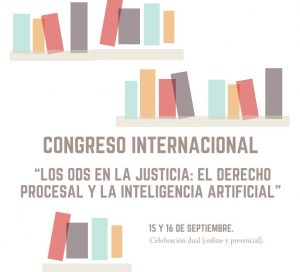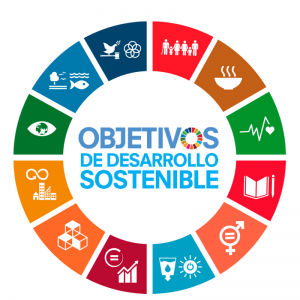UMH research project analyzes the judicial organization from the perspective of the SDGs
Agenda 2030, COOPERACIÓN Y VOLUNTARIADO, ods, Proyectos Cooperación al Desarrollo
27 April 2022
The research project at the Miguel Hernández University of Elche (UMH) entitled “Estudio comparado de modelos procesales desde la perspectiva de los ODS. Una mirada a la Inteligencia Artificial” (“Comparative Study of Procedural Models from the Perspective of the SDGs. A Look at Artificial Intelligence”) has contributed to the analysis of the judicial organization from the point of view of compliance with the Sustainable Development Goals (SDGs) to confirm whether procedural systems contribute to perpetuate or eradicate social inequality. The project also analyzed how artificial intelligence affects the administration of justice and the risks of segregation deriving from the replacement of judicial interpretive tasks with algorithms.
 Paloma Arrabal, a UMH assistant professor of procedural law, coordinated the project. Other project participants included researchers from Chile, Colombia, and Peru, in addition to faculty from the Pontifical Catholic University of Peru. Such participation enabled transversal analysis of the manner procedural law can contribute to fulfillment of the Sustainable Development Goals. Their efforts contributed to the fulfilment of several of these goals, including SDG 17, Strengthen the means of implementation and revitalize the global partnership for sustainable development; SDG 16, Promote peaceful and inclusive societies for sustainable development, provide access to justice for all and build effective, accountable and inclusive institutions at all levels; SDG 1, End poverty in all its forms everywhere; SDG 2, End hunger, achieve food security and improved nutrition and promote sustainable agriculture; SDG 3, Ensure healthy lives and promote well-being for all at all ages; SDG 4, Ensure inclusive and equitable quality education and promote lifelong learning opportunities for all; SDG 5, Achieve gender equality and empower all women and girls; SDG 8, Promote sustained, inclusive and sustainable economic growth, full and productive employment and decent work for all; and SDG 10, Reduce inequality within and among countries.
Paloma Arrabal, a UMH assistant professor of procedural law, coordinated the project. Other project participants included researchers from Chile, Colombia, and Peru, in addition to faculty from the Pontifical Catholic University of Peru. Such participation enabled transversal analysis of the manner procedural law can contribute to fulfillment of the Sustainable Development Goals. Their efforts contributed to the fulfilment of several of these goals, including SDG 17, Strengthen the means of implementation and revitalize the global partnership for sustainable development; SDG 16, Promote peaceful and inclusive societies for sustainable development, provide access to justice for all and build effective, accountable and inclusive institutions at all levels; SDG 1, End poverty in all its forms everywhere; SDG 2, End hunger, achieve food security and improved nutrition and promote sustainable agriculture; SDG 3, Ensure healthy lives and promote well-being for all at all ages; SDG 4, Ensure inclusive and equitable quality education and promote lifelong learning opportunities for all; SDG 5, Achieve gender equality and empower all women and girls; SDG 8, Promote sustained, inclusive and sustainable economic growth, full and productive employment and decent work for all; and SDG 10, Reduce inequality within and among countries.
The execution of the project resulted in publications and multiple activities, webinars, and forums, such as the “SDGs in Justice: Procedural Law and AI” international congress, which reflected on the most efficient and transparent regulations for building independent, just, and sustainable judicial institutions, by analyzing the role of the SDGs and the affects from artificial intelligence. Furthermore, the researchers participated in the Doctoral Program in Procedural Law at the University of Medellin (Colombia) on gender violence and discrimination in access to justice by vulnerable groups and the SDGs, with special attention paid upon victims of gender violence, poverty, and migration.
This project was co-funded by the UMH and the Generalitat Valencia through a 2019 university cooperation agreement signed by both institutions, and the project was executed by the Area of Development Cooperation and Volunteerism at the Vice Rectorate for International Relations at the UMH.


